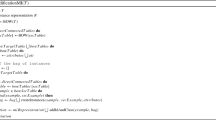Abstract
Multi-relational classification is an important data mining task, since much real world data is organized in multiple relations. The major challenges come from, firstly, the large high dimensional search spaces due to many attributes in multiple relations and, secondly, the high computational cost in feature selection and classifier construction due to the high complexity in the structure of multiple relations. The existing approaches mainly use the inductive logic programming (ILP) techniques to derive hypotheses or extract features for classification. However, those methods often are slow and sometimes cannot provide enough information to build effective classifiers. In this paper, we develop a general approach for accurate and fast multi-relational classification using feature generation and selection. Moreover, we propose a novel similarity-based feature selection method for multi-relational classification. An extensive performance study on several benchmark data sets indicates that our approach is accurate, fast and highly scalable.
Access this chapter
Tax calculation will be finalised at checkout
Purchases are for personal use only
Preview
Unable to display preview. Download preview PDF.
Similar content being viewed by others
References
Burges, C.J.C.: A Tutorial on Support Vector Machines for Pattern Recognition. Data Mining Knowledge Discovery 2(2), 121–167 (1998)
Quinlan, J.R.: Induction of Decision Trees. Machine Learning 1, 81–106 (1986)
Lavrac, N., Dzeroski, S.: Inductive Logic Programming: Techniques and Applications. Ellis Horwood, New York (1994)
Muggleton, S.: Inductive Logic Programming. New Generation Computing 8(4), 295–318 (1991)
Muggleton, S., Raedt, L.: Inductive Logic Programming: Theory and methods. Journal of Logic Programming 19, 629–679 (1994)
Lloyd, J.W.: Foundations of Logic Programming. Springer, New York (1987)
Quinlan, J.R., Cameron-Jones, R.M.: Foil: A Midterm Report. In: Brazdil, P.B. (ed.) ECML 1993. LNCS, vol. 667, pp. 3–20. Springer, Heidelberg (1993)
Muggleton, S.: Inverse Entailment and Progol. New Generation Computing 13, 245–286 (1995)
Blockeel, H., Raedt, L.D.: Top-down Induction of First-order Logical Decision Trees. Artificial Intelligence 101(1-2), 285–297 (1998)
Quinlan, J.R.: C4.5 Programs for Machine Learning. Morgan Kaufmann, California (1993)
Yin, X.X., Han, J.W., Yang, J., Yu, P.S.: Crossmine: Efficient Classification across Multiple Database Relations. In: ICDE, pp. 399–411 (2004)
Kramer, S.: Relational Learning VS Propositionalization: Investigations in Inductive Logic Programming and Propositional machine learning. Technical report, Vienna University of Technology (1999)
Lavrac, N.: Principles of Knowledge Acquisition in Expert Systems. PhD thesis, Faculty of Technical Sciences, University of Maribor (1990)
Srinivasan, A., King, R.D.: Feature Construction with Inductive Logic Programming: A Study of Quantitative Predictions of Biological Activity Aided by Structural Attributes. Data Mining Knowledge Discovery 3(1), 37–57 (1999)
Krogel, M.A.: On Propositionalization for Knowledge Discovery in Relational Databases. PhD thesis, Fakultat fur Informatik, Germany (2005)
Perlich, C., Provost, F.: Aggregation-based Feature Invention and Relational Concept Classes. In: Proceedings of the 9th International Conference on Knowledge Discovery and Data Mining, New York, pp. 167–176 (2003)
Molina, L.C., Belanche, L., Nebot, A.: Feature Selection Algorithms: A Survey and Experimental Evaluation. In: ICDM 2002 (2002)
Yin, X.X., Han, J.W., Yu, P.S.: Cross-Relational Clustering with User’s Guidance. In: KDD 2005 (2005)
Author information
Authors and Affiliations
Editor information
Editors and Affiliations
Rights and permissions
Copyright information
© 2010 Springer-Verlag Berlin Heidelberg
About this paper
Cite this paper
Zou, M., Wang, T., Li, H., Yang, D. (2010). A General Multi-relational Classification Approach Using Feature Generation and Selection. In: Cao, L., Zhong, J., Feng, Y. (eds) Advanced Data Mining and Applications. ADMA 2010. Lecture Notes in Computer Science(), vol 6441. Springer, Berlin, Heidelberg. https://doi.org/10.1007/978-3-642-17313-4_3
Download citation
DOI: https://doi.org/10.1007/978-3-642-17313-4_3
Publisher Name: Springer, Berlin, Heidelberg
Print ISBN: 978-3-642-17312-7
Online ISBN: 978-3-642-17313-4
eBook Packages: Computer ScienceComputer Science (R0)




